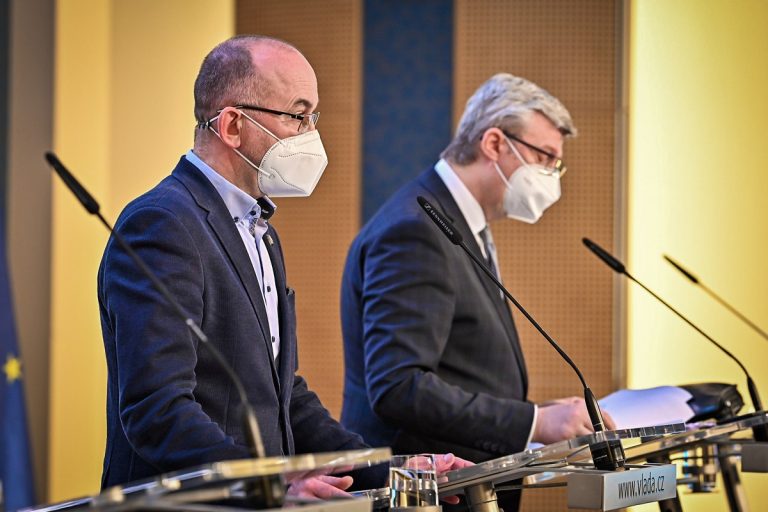Companies which employ at least 10 people have been mandated by the government to test their staff for coronavirus. According to Health Minister Jan Blatný, the current measures regarding respirators and restriction of movement between districts could be extended until after Easter. The government will discuss a further extension to the state of Emergency. Photo: Minister of Health J.Blatný and Minister of Industry and Trade K. Havlíček at the press conference on March 15. Credit: Vlada.cz.
Czech Rep., Mar 16 (BD) – On Monday afternoon, the government approved mandatory antigen testing in companies with 10 to 49 employees. As for larger companies, the testing is mandatory once per week, with exemptions for employees who have been fully vaccinated or who have contracted coronavirus in the last 90 days.
‘‘There are another 650,000 employees who will be tested compulsorily, with the proviso that this must be carried out in these companies by March 26th,’’ said Minister of Industry and Trade Karel Havlíček (ANO). By March 12th, testing was completed in large companies, and medium-sized companies completed testing on March 15th.
The government is considering the requirement for twice-a-week testing in companies. The minister explained that this would be demanding logistically, ‘‘for example, in a company with several thousand employees, testing twice a week is not entirely simple,’’ said Havlíček. Before a final decision can be made, the plan must first be discussed with company representatives, unions, associations and chambers.
The Union of Small and Medium-sized Enterprises (SMEs), which represents 1,000 company and self-employed members, has questioned the government’s recent decision as they consider the number of affordable self-tests available to be insufficient. ‘‘We do not understand why the Minister of Industry demands an increase in the number of companies testing and at the same time is considering testing twice a week, when he himself and several experts acknowledge that the antigen testing method is much less reliable than PCR testing,’’ said Radomíra Harantová, 1st Vice-Chairman of the SME Union.
The minister believes the decision was right, explaining that companies which have testing systems already in place show lower positivity rates of coronavirus. ‘‘Regarding testing in general, we consider the project to be successful. At the moment, we test 200 to 300 thousand workers a day,’’ said Havlíček. He said that 12 million self-tests are needed each month, and that the supply is sufficient.
The government will reimburse the cost of one test per week, which is 60 crowns, or 240 crowns per month. Employees in micro-companies (nine employees or fewer) are not subject to mandatory testing, but can apply for reimbursement of 60 crowns per week for self-testing through their health insurance companies.
According to ČTK, the Ministry of Health is preparing an amendment to the law to allow health insurance companies to contribute to coronavirus self-testing from the prevention fund. It should be presented to the Chamber of Deputies within a few weeks.
Health Minister Jan Blatný told reporters on Monday that the current measures, due to end on March 21st, will be extended due to the ongoing capacity challenges in hospitals. Extension of the measures and the state of emergency will be discussed on Thursday.
‘‘I can say in advance that the measures that will be in place after March 21st will not differ significantly from the current ones, and I will also suggest to the government that it should request an extension of the state of emergency for some time to come. Because especially during the Easter holidays, it is necessary to insist on restrictions on movement, otherwise we would risk a situation which could be similar to the one that took place around the Christmas holidays,’’ said Blatný.






